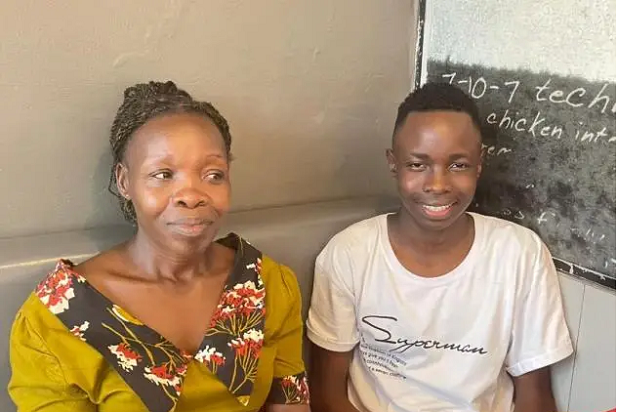Dan Mukisa and his mother
Fourteen-year-old Dan Mukisa made his mother proud by scoring 4 aggregates in the recently released Primary Leaving Examination (PLE) results. Prior to the school closures triggered by COVID-19, Mukisa was in primary five at Hillside Primary School in Naalya.
Despite the fact that his parents were unable to provide the necessary resources for Mukisa to continue with online learning, he was still able to perform exceptionally well in his final exams.
His mother, Jennifer Masayi, a resident of the Namugongo-Mbalwa zone, says that her son relied on his friends and notes from his classmates who visited during the weekends.
“We had no money for online learning. Actually, even before the lockdown, we were struggling to keep him at Hillside Primary School in Naalya, but the school had given him a bursary. We were contributing something small. When schools reopened, we decided to return him to school for normal learning just like any other learner,” says Masayi.
Having been in primary five in 2020, when schools reopened in 2023, Mukisa set out to go to primary six as the government had declared an automatic promotion for all learners. However, his mother says that on reaching school, the learner dared and asked if he could join primary seven instead.
The urge possibly came from the fact that most of his classmates who attended online lessons during the lockdown were moving on to primary seven, including some who were not as advanced as he was prior to the school closures.
Peter Ndawula, a teacher at Naalya, says that Mukisa was dedicated and bright, always performing well in lower classes. He adds that even though he skipped p.6 and never studied during the lockdown when he entered primary seven, it was only a matter of time before he caught up.
“He did better than his classmates who studied during the lockdown, which is impressive. I remember him being very attentive during remedial classes when teachers were reviewing content that he had missed,” says the teacher.
Mukisa’s situation is not unique, as many parents across the country pleaded for their primary five children to proceed to primary seven.
Some argued that their children had continued their studies during the lockdown, while others cited that their children were getting too old to remain in lower classes.
Like many other schools, Hillside Primary School in Naalya also allowed learners like Mukisa to move to primary seven on the condition that they pass a pre-entry examination. “He passed the examination but not as high as he used to perform in the lower classes,” the mother noted.
Mukisa, however, notes that the first term in primary seven was challenging, and his performance was not up to par. He adds that at one point, his mother even considered returning him to primary six, but he was determined to persevere and insisted that he could manage.
Medard Kamwesigye, the headteacher of Tropical Junior School notes that many other children who had been in primary five ended up passing the examination very well.
“Don’t forget that there are two categories of learners we are talking about; those who studied during the lockdown and those who literally had no means to learn. These are largely in rural areas and from poor families. But, many candidates from both categories made it,” Kamwesigye adds.
He says information from his school and from discussions with other headteachers, even those whose pupils did not study during the lockdown were able to pass, with the majority scoring between 11 and 20 aggregates.
With learners who had skipped the P.6 passing examination, there has been an awakened discussion on whether primary should be six or seven years. Last year, Uwezo proposed that primary education be reduced to six years.
While appearing before the education policy review commission, Dr. Mary Goretti Nakabugo, the Uwezo country coordinator, said that available data and experience from other countries suggest that six years are sufficient for the primary cycle.
“The reason why we’re suggesting a reduction of seven years to six years is that there is no evidence to show that the skills that can be acquired in seven years cannot be acquired in six years,” she said.
The educationist added that in the current primary school cycle much time in some classes is wasted on the revision of previous topics, which can be avoided with the system concentrating on the learning outcomes that are expected from the primary school leavers.
However, Kamwesigye notes that it’s difficult to judge the importance of seven years of primary school based on a single exam result, as UNEB asks questions from primary one to seven. He believes a student could have passed simply due to questions not being asked from areas they missed.
Kamwesigye says that he does not advise skipping a class like primary six, as the skills and competencies gained from that class may be crucial for future learning, and missing them could have negative consequences.
Filbert Baguma, the Secretary General of the Uganda National Teachers Union, agrees with Kamwesigye to some extent. He believes average learners should not be made to skip classes, as this may affect their learning.
However, Baguma notes the need for policymakers to consider exceptional learners. He believes that if a learner is exceptionally bright, they should be given special attention and allowed to progress at their own pace.
Baguma notes the failure of the education system to accommodate exceptional learners and limits them to the number of years set by UNEB for each level of education before taking national exams.
-URN




